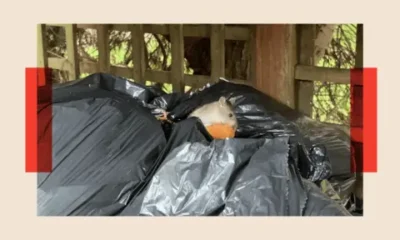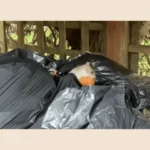Business
Tony Blair in discussions to run transitional Gaza authority
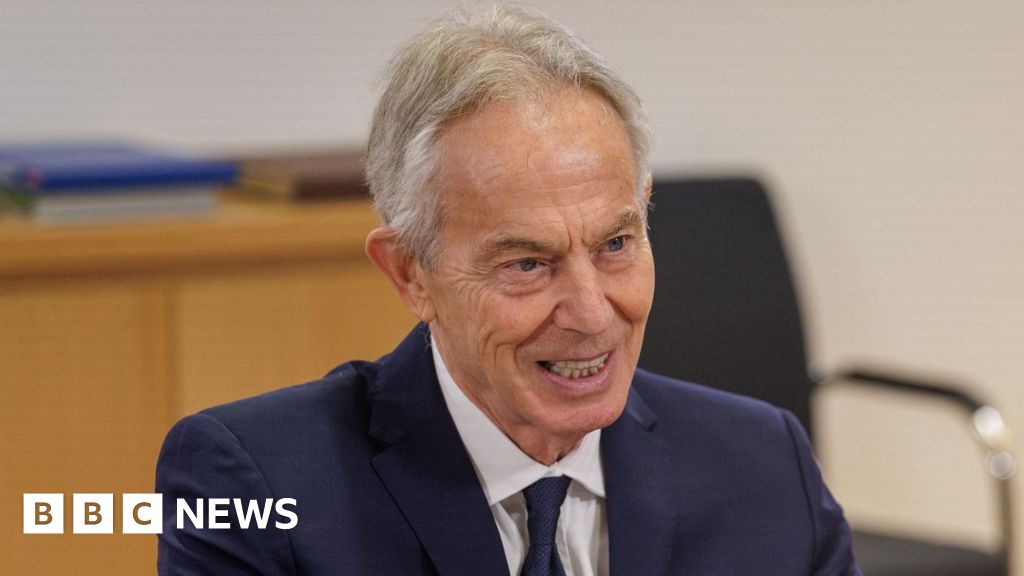
Read full article on post.
The former UK Prime Minister Sir Tony Blair has been involved in discussions about running a transitional authority in Gaza if there is a ceasefire, the BBC understands.
Sir Tony, who took the UK into the Iraq War in 2003, has been in high-level planning talks with all parties to end the war and on the post-conflict future for the Palestinian territory, it is understood.
At the heart of the latest proposal – discussed by US President Donald Trump and Arab leaders at the UN this week – is the idea of Gaza being run by a transitional body with UN backing and Gulf support, before being handed back to Palestinian control.
One proposal said to have gained support in Washington is for Sir Tony to lead that authority, although his office has said only that he would not support anything that displaced the people of Gaza.
Sir Tony joined a White House meeting with Trump in August to discuss plans for post-war Gaza, which the US Middle East envoy Steve Witkoff described as “very comprehensive” – though little else was disclosed about the meeting.
The former prime minister served as Middle East envoy for the Quartet of international powers (the US, EU, Russia and the UN) for a few years after leaving office in 2007. He focused on bringing economic development to Palestine and creating the conditions for a two state-solution.
As PM, he took the decision to commit British forces to the 2003 Iraq War that was heavily criticised in the official inquiry into the conflict, which found he had acted on flawed intelligence without certainty about the production of weapons of mass destruction there.
Reports of discussions about his involvement in a transitional authority for Gaza come after Palestinian President Mahmoud Abbas said on Thursday that he was ready to work with Trump and other world leaders to implement a two-state peace plan.
Abbas stressed his rejection of a future governing role for Hamas in Gaza and demanded it disarm.
Earlier this week, the UK formally recognised the state of Palestine alongside Canada and Australia. More countries followed this example, including France and Denmark, while Israel and the US criticised the move as a reward for Hamas.
Sir Keir emphasised the diplomatic move means Hamas can have “no future, no role in government, no role in security” and was the “exact opposite of their hateful vision”.
The Israeli military launched a campaign in Gaza in response to the Hamas-led attack on southern Israel on 7 October 2023, in which about 1,200 people were killed and 251 others were taken hostage.
At least 65,419 people have been killed in Israeli attacks in Gaza since then, according to the territory’s Hamas-run health ministry. A UN commission of inquiry has said Israel has committed genocide against Palestinians in Gaza, which Israel denies.
Business
Ratmageddon: Why rats are overrunning our cities
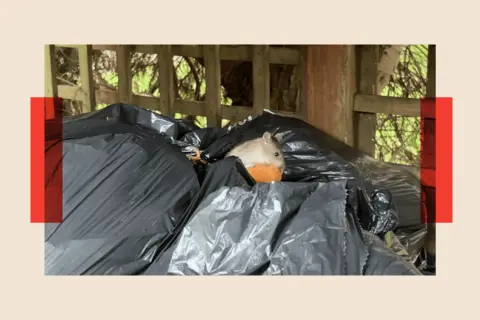
Read more on post.
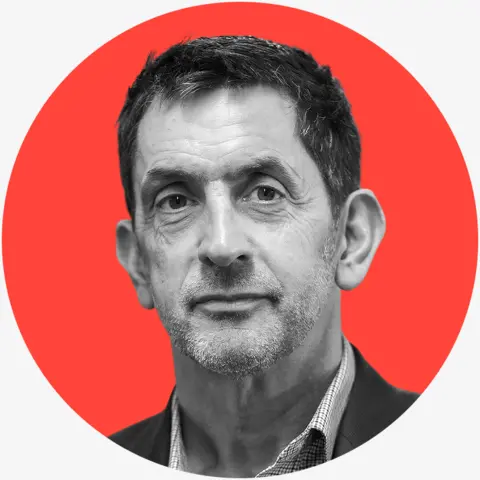 Justin RowlattClimate Editor
Justin RowlattClimate Editor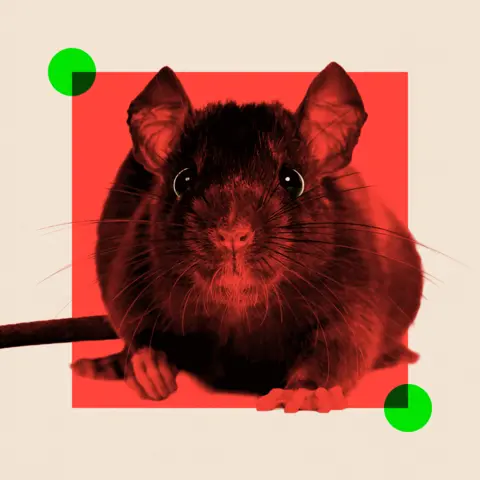 BBC
BBCOne morning last year, John Gladwin opened the cupboard under his kitchen sink and discovered a bag of soil he’d been storing there was torn to shreds.
Days later he noticed a pungent smell too. It was musty and slightly astringent, not unlike the communal bin area in his block of flats.
“I knew what it was straight away,” he says. “Rats.”
He’d often seen them scurrying around near bins. Now they were inside his home too.
“I heard them in the cupboards and behind the bath panel. One morning when I woke up they were fighting under the bath, screaming and squealing.”
Gladwin, who lives in Croydon with his five children, acted immediately. He put down peppermint oil and rat poison and so far they haven’t returned. But the experience shook him.
“I was worried for the children’s health, I didn’t want them catching anything,” he tells me.
But there was another feeling too: shame.
“It’s not nice to say we’re infested, that our family is living in a rat-infested property.”
Cleankill, the pest control company tasked with tackling the infestation on Gladwin’s estate, works across the south of England. Its founder, Clive Bury says he has seen a “remarkable” increase in call outs for rat activity, estimating a 20% increase in the last two years.
Similar patterns are being reported across the country. Trade body the British Pest Control Association (BPCA) says more than half of the pest control companies who are members have seen an increased number of rat callouts over the last five years.
Because rats live in drains, sewers and burrows, and emerge mostly at night, counting them is nearly impossible, so estimates on rat population figures vary. In the UK it could be anywhere from 10 million to 120 million.
What is known is that more than half a million rat infestations were reported to UK councils, between 2023 and the middle of this year, according to Freedom of Information requests gathered by drainage repair company, Drain Detectives.
But it’s not just affecting the UK. Rat numbers are reported to have spiked in several US cities too, including Washington DC, San Francisco and New York City, as well as in Amsterdam and Toronto.
Though they’re not inherently dirty animals, rats scavenge in sewers and bins and can pass on serious diseases to humans. Leptospirosis (Weil’s disease) is transmitted through their urine, and hantavirus can be spread by breathing in infected droppings. They can also eat their way through farm produce and contaminate food supplies.
So, given rats have shown themselves to be wily in avoiding being caught – what would it really take to stop them? Or are we too far gone to prevent rats from overrunning our cities?
Rising temperatures, rising rat activity
Bobby Corrigan calls himself an urban rodentologist. He started out as an exterminator in New York City and has spent his life immersed in rats.
“I ended up in sewers, trying to hang poison baits to kill rats.”
Years later, while studying rats in college, he went to extreme lengths to understand their behaviours – once he slept on the floor of a rat-infested barn to observe it first hand.
What astonished him was their complex social structure, and evidence of what he believed to be signs of altruism. “I saw young rats carrying food and giving it to older rats that couldn’t get around,” he remembers.
He was also determined to understand the reasons for the rise.
There are many possible reasons for this. Niall Gallagher, technical manager at the BPCA, says our growing appetite for fast food, the fact some councils collect rubbish less frequently, as well as road and building works disturbing the sewer network, all contribute.
But there is evidence that rising temperatures might also be at play.
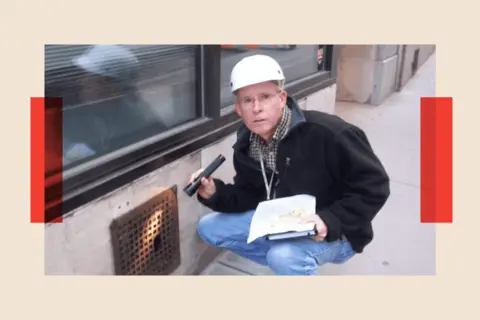 Bobby Corrigan
Bobby CorriganScientific evidence has found that rat populations are sensitive to temperature but Dr Corrigan, who previously worked at the New York City Department of Health as a research scientist, together with researchers from the University of Richmond, Virginia, set out to find out whether the rise in rat activity correlated to temperature increases.
Their study examined 16 cities, mostly in North America, and the results, published in the journal Science Advances earlier this year, found that 11 of them recorded significant increases in rat activity over a period of between seven and 17 years.
In Washington DC the increase was almost 400%, in San Francisco it was 300%, Toronto 180% and New York 160%. Only three cities saw declines, including Tokyo and New Orleans.
“Cities experiencing greater temperature increases over time saw larger increases in rats,” the study found. Those increases approached 2C in some places during the study period.
Dr Corrigan believes that – as long as temperatures continue to rise, and in particular winters become warmer – the increase in rat numbers is likely to continue.
And global temperatures are indeed set to rise between at least 1.9C and 2.7C above the pre-industrial average by 2100, according to Climate Action Tracker, a group of independent climate researchers.
Rats do not hibernate, so when exposed to the cold, it can kill them outright or result in them producing fewer pups, as baby rats are known – which in turn slows population growth.
Phenomenal breeders – until it’s cold
Rats are phenomenal breeders. A female typically has around six litters a year, each with up to 12 pups.
Those rats can start breeding after nine weeks, meaning two rats can potentially create more than 1,000 offspring in a single year.
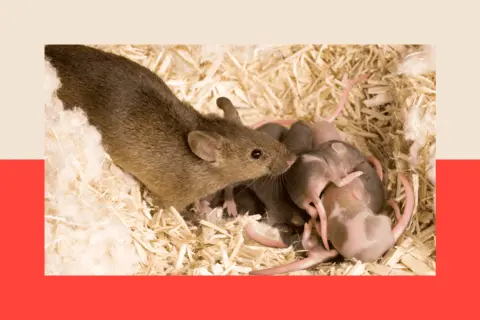 Universal Images Group via Getty Images
Universal Images Group via Getty ImagesResearchers say numbers are particularly prone to increase in cities. That’s because their heat-trapping tarmac and buildings tend to warm more quickly than rural areas.
And the trend of people moving from rural areas to cities is playing a part too, according to Dr Corrigan.
“Land is disappearing like crazy, and we’re putting up buildings so we reduce their [rats] habitat in the wild,” he says.
Extra buildings means more nooks, pipes and drains for rats to live in. Which all adds to the challenge of how to best control growing populations.
Rats’ surprising superpower
One of the curious facts about rats – and one begins to explain why poison baits often don’t work – is that they cannot vomit.
In theory this means that once rat poison is ingested, they can’t get rid of it. But rats are also “neophobic” or fearful of new things, according to Professor Steven Belmain, a professor of ecology at the University of Greenwich. He believes the two points are related.
It is something of a “superpower”, he says, as when they come across a potential food they don’t just dive in.
“They will only try a little bit. So once they understand that they don’t feel ill, they’ll realise, ‘okay, I can eat that’.
“You could argue that this cautious approach to life has stood them well.”
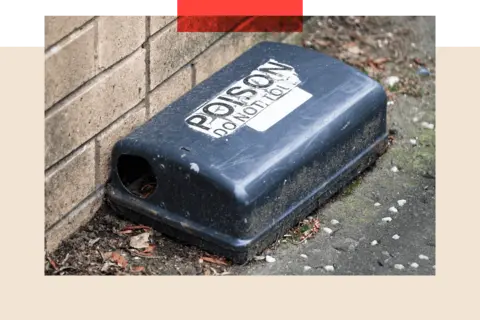 Getty Images
Getty ImagesDr Alan Buckle of the University of Reading has spent 30 years working to develop new rat poisons but – he tells me with a laugh – “I failed”.
If a poison tastes bad or causes any discomfort or pain to a rat, they will not eat more. Which is why slower-acting substances, mainly anticoagulants – drugs that stop blood forming into clots – are used.
These take up to a week to act, giving enough time for rats to eat a lethal dose. But they are recognised as a cruel way to die, killing the rats by causing internal bleeding.
What’s more, in recent years rats have developed genetic mutations that give them some immunity to these powerful drugs too.
Some researchers are looking at the possibility of using oral contraceptives as an alternative, more humane way to prevent rat numbers growing further.
On patrol with the Rat Tsar
Few know this challenge better than Kathleen Corradi, a former schoolteacher who was appointed the city’s Rat Tsar by the New York Mayor in 2023.
An estimated three million rats live in the five boroughs and Corradi was reportedly awarded $3.5m (£2.6m) to increase public awareness about rat mitigation.
She started what she calls a “rat academy” that teaches people how to stop their neighbourhood from being overrun by rats.
 New York City Hall
New York City Hall“They take a rat walk with me, where we go out into neighbourhoods, and we talk about human behaviour and we talk about rat behaviour,” she told the BBC earlier this month.
“We talk about how it all comes together and what they could be doing in their neighbourhoods.”
Her team also urged New York residents to phone in if they see rats or evidence of behaviours likely to encourage rats. Inspectors investigate the reports and order action, with stiff fines if it isn’t taken.
And there was another crucial change – instead of putting their rubbish out on the street in plastic bags, now most New Yorkers are obliged to put their waste in rat-proof bins.
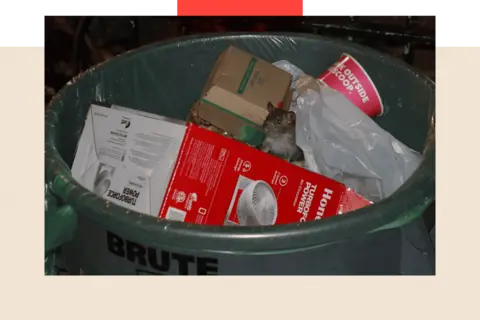 Getty Images
Getty ImagesCorradi is now leaving the role, but she says the approach is showing some progress.
Ultimately, she explained, “cutting off rats’ food source is the key to a sustained reduction”.
Overflowing bins and fast food
Back in Croydon, Alex Donnovan, a pest controller for Cleankill, leads me into the backyard of the estate where John Gladwin lives. It is just after dawn, and he gestures for me to stay still and keep quiet.
Moments later, there is a rustling and a rat darts from beneath the concrete walkway towards the communal bins. Next, the head of a large rat emerges from a burrow at the end of the garden.
During the two hours we spent on the estate, some rats climbed high into a tree, while a particularly brazen one jumped into a bin and pulled a hunk of food from a plastic bag while I watched on, less than a metre away.
Mr Donnovan believes it is almost impossible to get control of an infestation of this scale. “There’s just so much food.” He gestures to bins overflowing with rubbish bags.
“Even if we put down rodenticide, they won’t eat it. They are just not interested… Once these bins are infested with rats, the bin men don’t want to collect it either.”

Warmer temperatures may well help fuel growing rat populations but our overflowing bins, fondness for fast food and fractured communities all add to the challenge of keeping it under control.
In the UK there are more people than ever are living in closer proximity. The Office for National Statistics projects the population will increase from 67.6 million in 2022 to 72.5 million by 2032, with the proportion living in urban areas growing too.
So, instead of hoping poison will do the trick, the solution could come down to something far more straightforward.
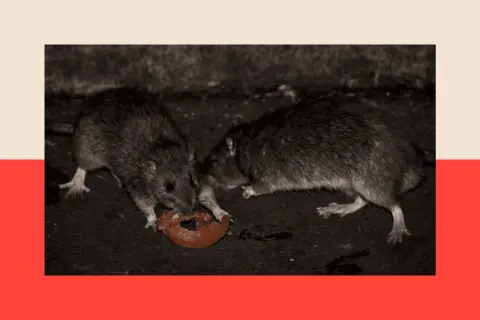 AFP via Getty Images
AFP via Getty Images“If we take care of our city environment, then we won’t have to worry about being so inhumane to them,” argues Dr Corrigan.
“By not giving [rats access to] the food and scraps, then we don’t have to poison them and kill them and torture them and all the crazy things we do to them.”
The challenge now is how to do that, and at speed. After all, as he puts it, we have already “underestimated them”.
“We ignored rats and let them get out of hand… and now we are paying the price.”
Additional reporting: Florence Freeman
BBC InDepth is the home on the website and app for the best analysis, with fresh perspectives that challenge assumptions and deep reporting on the biggest issues of the day. And we showcase thought-provoking content from across BBC Sounds and iPlayer too. You can send us your feedback on the InDepth section by clicking on the button below.
Business
‘The Trump effect’ and four other factors that may decide the Ryder Cup
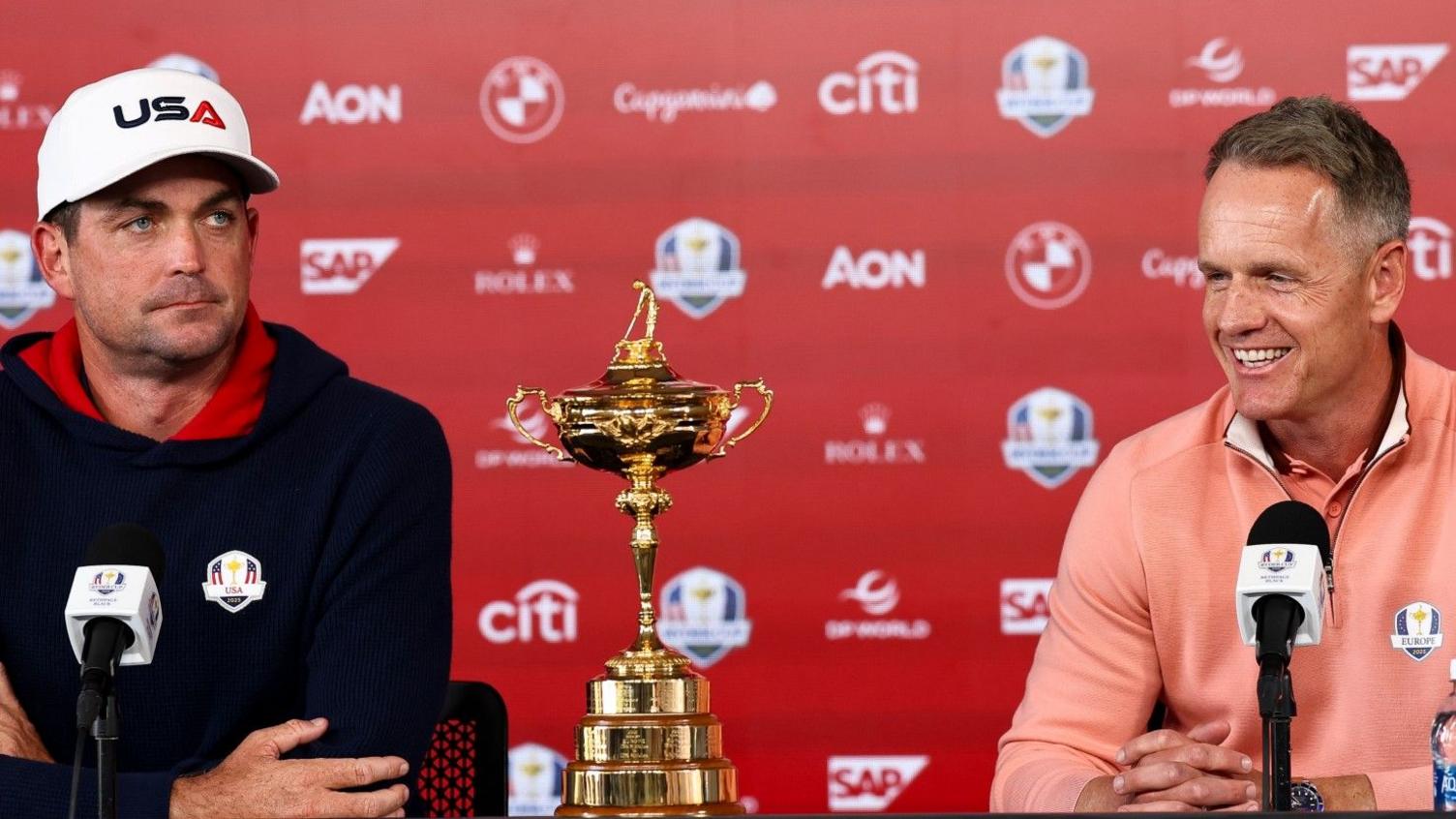
Read full article on post.
-
25 September 2025
The past five Ryder Cups have ended in resounding victories for the home side.
Will Bethpage be any different this week as the US look to win back the trophy that Europe so convincingly regained in Rome?
While the bookmakers have the home side as slight favourites, there are a host of reasons why Europe are being tipped to win away for the first time since 2012.
Fast starts, blocking out the noise, experience and the Trump effect are among the key issues that will decide the outcome of this Ryder Cup, which gets under way on Friday.
2025 Ryder Cup
26-28 September
Bethpage Black, New York
Daily live text commentary and in-play clips on BBC Sport website from 11:30 BST. Radio commentary on BBC Radio 5 Live and BBC Sounds from 12:00. Daily TV highlights on iPlayer from 00:00.
A fast start required
In the immediate aftermath of victory in Rome, Rory McIlroy called winning an away match “one of the toughest things to do in golf”.
On Thursday, he upped the ante a little more by saying that Europe have the chance this week to “go down as one of greatest Ryder Cup teams in history”.
And Friday’s opening session is likely to be pivotal in deciding the eventual winner.
In each of the past five events the overall victors have trounced the visitors in the first-day foursomes. Europe dropped only half a point out of 12 in these sequences in the triumphs of 2014, 2018 and 2023.
At Whistling Straits four years ago the US took the opening foursomes 3-1 en route to a record 19-9 victory. In 2016 they won the Friday foursomes session 4-0 at Hazeltine and Europe never truly recovered.
In the most recent away matches of 2016 and 2021, Europe trail 11½-4½ in foursomes. It feels as though they have to reverse this trend to have any chance this week.
It is the tone-setter for the three days of competition.
Overcoming the home advantage
A quick start is also vital because it could determine whether New York’s notoriously boisterous fans turn Bethpage into a “bear pit” from the playground it has been so far.
The build-up has been dominated by talk of how the home fans will treat the away players.
American Collin Morikawa said the atmosphere has been “tame” during the practice days, with lots of autograph-hunting kids admitted for free. He is hoping for “absolute chaos” come Friday.
Keeping the fans subdued will be high on Europe’s agenda.
The US won by 10 points in 2021’s ‘walloping in Wisconsin’, with the home supporters celebrating victory as early as midway through the second of the three day’s play, emboldened by Justin Thomas’ beer-swilling, can-throwing antics on the first tee.
Last time out, the stands that towered over the first tee in Rome proved too intimidating for the American players. They failed to win the opening hole in any of the first dozen matches as Europe romped to an early lead they wouldn’t relinquish.
As at Whistling Straits four years ago, the visitors have been on a charm offensive, signing thousands of autographs and posing for selfies but they know the noise will be turned up come game day.
European captain Luke Donald dished out virtual reality headsets, which could be programmed with all manner of abuse, to his players. A gimmick perhaps but if it provides a marginal gain for one player it will have been deemed worth it.
The Europeans have all talked down the impact of the crowd, Robert MacIntyre alluded to controlling the controllables and in a mantra oft repeated by his team-mates, simply said “it’s my job to play good golf”.
Justin Rose knows the importance of getting European blue on the board, having been a key member of the last team to win away in 2012 – the famed ‘Miracle at Medinah’ when Europe recovered from 10-4 down late on the Saturday, to win 14.5-13.5.
“As soon as we were able to flip the script, the crowd did change, they did go quiet,” he told BBC Sport.
“They didn’t like it and that’s going to be our goal, to pacify the crowd.”
Donald v Bradley
Luke Donald does not lose Ryder Cups. As a player, he played four, won four. As a captain, led one, won one.
The experience of winning in Rome has laid the perfect foundation for this week. His build-up has appeared calm, helped by having the benefit of a settled team, with just one new face among his dozen in Rasmus Hojgaard replacing his twin brother Nicolai from Rome.
And he has been on script with his messaging here in New York, delivering his thoughts in an assured manner, with perhaps just one sly dig at the Americans being paid for the first time at a Ryder Cup during his opening ceremony speech.
His opposing number has had a more cluttered countdown. A little more than a year ago Keegan Bradley admitted he was as surprised as anyone when he was asked to lead the side in the wake of Tiger Woods turning down the captaincy.
Most of the following 12 months was spent debating whether he would select himself as the first player-captain since Arnold Palmer in 1963. Eventually sense prevailed and Bradley, who finished 11th on the US qualifying list, opted to focus solely on the leadership role.
But he then fumbled his opening ceremony speech on Wednesday. “I was 13 years old, perched on my dad’s shoulders, watching Justin Rose’s miracle putt drop on 17,” he said, intending to refer to Justin Leonard’s infamous putt at 1999’s ‘Battle of Brookline’ and the ensuing controversial celebrations, despite Jose Maria Olazabal having a chance to halve the hole.
A sign of nerves?
Rory McIlroy was not going to miss an open goal, telling BBC Sport on Wednesday that when they returned to the team room after the opening ceremony “we got Justin Rose to apologise to Jose Maria for running all over his line at Brookline”.
Experience to count?
To play this video you need to enable JavaScript in your browser.
This video can not be played
Europe certainly have the advantage in terms of playing experience, with 32 appearances between their dozen, compared with 15 for the US.
Naturally, Europe’s players have won more points too, leading 68½-30 in that category.
McIlroy and Justin Rose are Europe’s veterans and are the only two players to have won away – although Donald was also on that team at Medinah in 2012.
Between them they have amassed 33½ points from 13 combined appearances and both arrived in New York on the back of excellent years.
McIlroy became just the sixth player to complete the career Grand Slam by winning the Masters in April, while Rose, beaten in a play-off at Augusta by his team-mate, won a PGA Tour title in August
Rose missed Whistling Straits but Tommy Fleetwood, Jon Rahm, Tyrrell Hatton, Matt Fitzpatrick and Shane Lowry are all returning for a second tilt on US soil.
Fleetwood said “all of us on that team didn’t feel like we did ourselves justice” and it was a huge motivating factor for Rome.
But that works both ways and he pointed out the US players will “have been hurt from last time”, adding “they’ll want to win in front of their home crowd, and that’s just as it should be”.
Scottie Scheffler is clearly the standout player for the Americans. The runaway world number one, has had another outstanding year, with two more major titles – the US PGA and Open Championship – among his six victories.
However, Sir Nick Faldo is adamant that Scheffler will be the only player Europe will fear this week.
“Scottie will be a target because he’s meant to win,” Faldo told BBC Sport. “If you just get a half point against him, that’s a victory. The rest don’t scare me.”
Scheffler went unbeaten as a rookie at Whistling Straits in 2021, but was reduced to tears in Rome after he and Brooks Koepka suffered a record 9&7 defeat at the hands of Viktor Hovland and Ludvig Aberg – both of whom return this week.
Justin Thomas and Patrick Cantlay may have something to say about Faldo’s comments though, given they have the best Ryder Cup records on the US team.
Thomas, who has eight points from 13 matches, was chief cheerleader in 2021, while Cantlay was the pantomime villain in Rome with ‘cap-gate’ and his caddie’s spat with McIlroy. But he has won five of his eight matches.
The Trump effect
Given he is a huge fan of the sport, it is not surprising that US President Donald Trump will be on site on Friday.
Fans, media and volunteers alike are all being urged to get to the course early because security will be super-tight and organisers are keen to avoid the disruption that was caused by Trump’s visit to the US Open men’s tennis final earlier this month.
“I hope he will inspire us to victory,” said Bryson DeChambeau, who has played with Trump.
“I think he’ll be a great force for us to get a lot of people on our side. It will be interesting and exciting to see how the crowd and everybody reacts.
“It’s going to be an electric environment.”
Business
‘Something must change’ – so what now for Rangers?

Read full article on post.
-
41 minutes ago
Underwhelming. Predictable. Disillusioned. Out with a whimper. No belief. Ran out of ideas.
Those disparaging words tumbled out of the mouths of several former Rangers players inside Ibrox on Thursday after the Europa League defeat by Genk – a fourth in their past seven games under Russell Martin.
There was no relish within what they said. Not even much anger. Just sadness, regret and frustration.
Even the ever-ebullient Ally McCoist was subdued.
“The manager is in big trouble,” the club’s legendary former striker and manager said on TNT Sports in the aftermath of the 1-0 loss.
“Something has to change, and change dramatically. This can’t go on for long. If people around the stadium don’t support you, there’s no point.
“I’m desperate for Russell Martin to turn things around but it looks miles off it.”
Martin’s unconvincing message wearing thin
When he fielded questions after the defeat, it sounded for the first time that Martin perhaps doubted his repeated insistence that better days lie ahead.
His “we’re not far away” mantra was there, but it wasn’t delivered in the usual bullish tone. Instead, the Rangers head coach was was short, snippy and sombre.
Despite his ability to pick out positive individual performances – which left pundits and punters perplexed – there was a hint that he knew things were slipping away.
This was another night when Rangers caused their own problems. A reckless red card. Scant creativity. A lack of impetus. Poor defending.
Had it not been for Jack Butland, the scoreline might have read something more similar to when they last faced a Belgian side.
Martin had insisted Rangers would “attack” this competition. But his side registered just two shots on target and had 13 touches in their visitors’ penalty area.
He claimed they were “in Genk’s box a lot, had good control and were aggressive” – a statement that took aback former Rangers midfielder Andy Halliday.
“I’m surprised he said Rangers were aggressive,” the Motherwell midfielder said on Sportsound. “I didn’t see aggression and I certainly didn’t see them create chances.”
Steven Thompson, who was alongside Halliday at Ibrox, admitted there was a tone of “acceptance” in Martin’s unconvincing message.
“There was a lack of energy in his press conference,” the former Ibrox striker said. “You could feel that it was getting to him.
“There was an acceptance there, he knows he’s under pressure. How long are we going to keep hearing ‘we’re going to get there’ for?”
To play this video you need to enable JavaScript in your browser.
This video can not be played
‘It’s as if Rangers players don’t believe’
Martin is not being helped by some of his players, either.
Against Genk, it was Mohamed Diomande, whose “sheer stupidity” – in the words of former Rangers midfielder Derek Ferguson – hampered his side’s hopes of building any sort of momentum from their weekend win against Hibs.
The midfielder’s needless first-half red card – a third in Martin’s first 14 games – knocked the stuffing out of an already struggling Rangers.
But, in truth, they were huffing and puffing before that moment of madness made life even more difficult.
Martin said his side were in control early on, but many would argue otherwise given Genk’s quick start and the penetrative runs of Zakaria El Ouahdi, in particular.
What left former Ibrox players amid the punditocracy most troubled was Rangers’ apparent lack of belief in themselves.
There was no fast start. There was no rolling up of the sleeves when their team-mate trotted off. There was no final push for a point. It was all just… meh.
“It’s a struggle,” Ferguson said on Sportsound during the game. “I know they’re down to 10 men but with 10, you can still always find a way.
“It’s as if Rangers players don’t believe there is a way back into this game.”
In the final five minutes, Rangers had a few near things, but nothing that troubled Genk goalkeeper Hendrik Van Crombrugge.
“Players are looking at each other asking, ‘what do we do?’,” added Thompson. “It looks like they’ve run out of ideas. Everything is so laborious and predictable.
“It frustrates the life out of the supporters and they don’t enjoy what they’re watching.”
‘Pack your bags’ – what are the fans saying?
Europa League nights have so often brought solace and soothed any domestic difficulties suffered by Rangers in recent seasons.
But Thursday never felt like it was going to be one of those explosive evenings.
Instead of excitement and electricity there was apathy and angst. Instead of being greeted by a bellowing sea of blue, swathes of empty seats greeted the players as they emerged from the tunnel.
Martin concedes only positive results will bring about change. Fans who have made their minds up were given nothing to persuade them to think again.
When BBC Scotland, asked fans for their views, very few were complimentary of the head coach.
Sam: Watching Martin’s interview. He never apologised to the fans that paid good money, he shrugged off questions and started waffling. His excuses are running dry and we don’t want to hear them anymore. Do the decent thing and pack your bags.
Robert: Martin has been given chance after chance, but the football is absolutely terrible and if there isn’t a change the support will walk away.
Seb: Insipid stuff. Lack of belief, no clear plan, possession for possession sake, open to almost every counter attack and no cutting edge up front. Best way to sum up the team and management is anaemic. Bereft of anything positive.
Mark: Until the new owners face facts and realise they made a mistake hiring Martin, I’ll refuse to follow or watch Rangers. We used to be a club feared – not anymore. I wouldn’t be surprised if we were relegated, that’s how shocking we are.
Sally: The players are there. They are not being managed. Possession is only of value if it is played to forwards. Tavernier needs to realise other players can take corners and free-kicks. He consistently left the defence exposed.
Duncan: Another overall poor performance by what can only be described as a mediocre Rangers team. Lack of any bite, cohesion and, it appears. any plan. Martin surely cannot be allowed to continue to embarrass a club that demands much more.
Get in touch
Send us your views on Rangers
Related topics
-
Culture3 days ago
Taylor Swift’s new cinema outing generates more than €12million in just 24 hours
-
Politics3 days ago
European Parliament snubs Orbán with vote to shield Italian MEP from Hungarian arrest
-
Health4 days ago
EU renews support for WHO’s Universal Health Coverage Partnership
-
Culture3 weeks ago
Life, loss, fame & family – the IFI Documentary Festival in focus
-
Environment6 days ago
Key oceans treaty crosses threshold to come into force
-
Culture3 days ago
Twilight at 20: the many afterlives of Stephenie Meyer’s vampires
-
Culture2 months ago
Fatal, flashy and indecent – the movies of Adrian Lyne revisited
-
Culture1 week ago
Farewell, Sundance – how Robert Redford changed cinema forever


